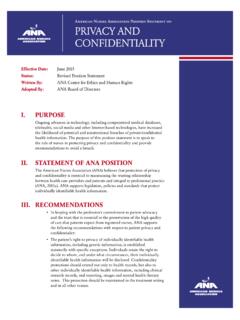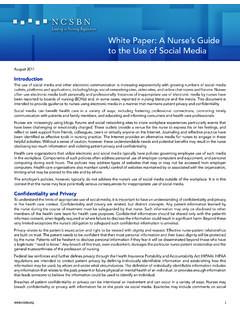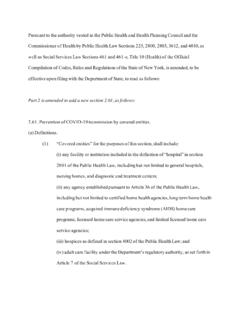Transcription of The state of data protection rules around the world
1 The state of data protection rules around the world A briefing FOR CONSUMER ORGANISATIONSAs the strongest data protection laws to date come into force for citizens in the European Union, Consumers International looks at the key components of the new EU General Data protection Regulation and takes a snapshot of data protection regulations for consumers across the International is the membership organisation for consumer groups around the world . It is a charity ( ) and a not-for-profit company limited by guarantee (No. 04337865) registered in England and is the EU General Data protection Regulation?The EU s General Data protection Regulation (or GDPR) came into effect on the 25 May 2018, replacing the previous minimum standards for processing data provided in the Data protection Directive of 19951. Though many of the main concepts and principles from the Directive underpin the GDPR, there are critical updates intended to address the implications of the digital age and the ways in which consumers and citizens data is collected, analysed and transmitted by new types of business practices and models, such as social networks, mobile applications and e-commerce.
2 For the consumer, GDPR has strengthened rights. Individuals now have the power to demand companies reveal or delete the personal data they hold. For regulators, GDPR makes provisions which stipulate that data protection law will become identical throughout all EU member states. This should encourage partnership working and create a more harmonious environment for regulators, who previously worked independently and had to launch separate actions in each jurisdiction. GDPR requires businesses to be more accountable to the people whose data they collect and imposes much tougher punishments for those who fail to comply. All businesses handling EU citizens data, whether based in the EU or outside, must comply with GDPR. Any business found not doing so could be charged fines of up to 20 million or 4% of the company s global annual main changes in more detail The internet has made it easy to access information by visiting a website, or to buy goods and services at the touch of a button.
3 But most consumers aren t always fully aware that in doing this, the organisations they deal with online are collecting vast amounts of personal data about them. This can be in the form of obvious things like your name and address, to tracking your browsing behaviour, location and inferring your preferences from this. This data is then used by companies in everything from sales to customer relationship management to marketing. The ease and sophistication of data collection means that thousands of companies not only collect personal details, but store it in often insecure locations, share it with third parties or move this data across borders to support their businesses. In addition, their business models rely on selling access to this data to advertisers who then target consumers with tailored (or creepy) advertising. With many security breaches now well publicised by the media , consumers are increasingly becoming aware about what happens to their data and have looming privacy concerns about what is being stored and processed, and by who.
4 Policy makers and regulators have recognised the lack of protection offered by the former Directive in this area and have updated GDPR to rectify it. For example, a key component of GDPR is the requirement for consent, which must be an active agreement by the data subject, rather than the current models offered through pre-ticked boxes or opt-outs. It also puts obligations on businesses to carry out privacy Impact Assessments for certain data use cases. This will have the effect of enabling businesses to consider more holistically what the organisation is doing with the data it collects and the impact it could have on people s privacy giving them a chance to look across the piece at what they are collecting and why. Another key feature is privacy by design, which forces a company to design their data collection and processing methods in accordance with data protection law.
5 In other words, they will need to ensure their data protection policies, structure and personnel are compliant. Some other significant enhancements to GDPR that will empower the consumer include: Audit trail: Companies must have a record of when and how an individual has given consent. Right to be forgotten: In some circumstances, GDPR gives individuals the power to get their personal data erased ie where it is no longer necessary for the purpose it was collected, if consent is withdrawn, there s no legitimate interest, or if it was unlawfully processed. In this instance the controller and the people they have shared your information with will need to ensure it is permanently decision-making: In some cases, individuals have the right not to be subject to decisions based on automated processing without any human intervention 1 EU, rules for the protection of personal data inside and outside the EUGDPR will replace the EU s previous data law adopted in 1995 before Google was even registered as a domain name.
6 Data portability: A new right under the GDPR, this enables individuals to request the transmission of their data to another controller to allow the data subject to make further use of the data. The further use could be to analyse bank transaction data for spending patterns and insights, or to move contacts from one network to another. Transparency of data collection and transmission: Companies must make clear how they collect people s information, what purposes they use it for, and the ways in which they process the data. This must be done in clear, easy to understand language. Accessing your data: People will a) no longer be charged to access their data and b) have the right to access any information a company holds on them within one month of asking. They can also ask for that data, if incorrect or incomplete, to be rectified. Mandatory breach notification: Companies monitoring protocols must be able to recognise and act on breaches as soon as they happen.
7 Companies must alert both their data protection authority and the people affected by the data breach within 72 hours of becoming aware of it, giving full details of the breach and an incident recovery plan proposal for mitigating its effects. Data protection Officer: Companies over a certain size who regularly and systematically monitor or process data on a large scale must employ a data protection officer who will act as a point of contact for employees and customers with data protection queries. Children: Businesses will need to seek parental consent to process children s data. What is happening across the world ?Concern about how much data is collected, loss of privacy , security risks and other consequences is growing. In 2016, 57% of consumers worldwide reported that they were more concerned about their online privacy than they were in 20142.
8 The GDPR is now the strongest data protection regime in the world , leading many to hope that it will set a gold standard for other jurisdictions. The requirement on companies that process EU citizens data to abide by the regulation regardless of location, adds weight to this and could be used as leverage by citizens of other countries, particularly where company activity crosses borders. That is the hope for the future but what is the current status of data protection laws across the world ? Globally, there is an increasing growth in data protection laws, many of which have been modelled on comprehensive guidelines or regulation such as the EU Directive mentioned above, or the OECD Guidelines on the protection of privacy and Transborder Flows of Personal Data3. According to UNCTAD data protection tracker 4, over 100 countries around the world now have data protection laws in place.
9 Below is a summary of which countries across the globe have full or draft data protection legislation in place, based on this Africa, 19 countries (Angola, Benin, Burkina Faso, Chad, Equatorial Guinea, Mali, Gabon, Ghana, Ivory Coast, Lesotho, Madagascar, Malawi, Morocco, Niger, Senegal, South Africa, Tunisia, Zambia) have enacted data protection and privacy laws. 6 have laws in draft stages (including Kenya, Nigeria, Togo, Tanzania, Uganda and Zimbabwe). The remaining countries either have no legislation or have no data a continent, the African Union adopted the progressive Convention on Cyber Security and Personal Data protection in 2014. Only ten countries (Benin, Chad, Comoros, Congo, Ghana, Guinea-Bissau, Mauritania, Sierra Leone, Sao Tome & Principe and Zambia) are signatories and only two (Mauritius and Senegal) have ratified the convention.
10 Regionally, there is effort to ensure data protection within regional blocs. For example the Southern African Development Community (SADC) has developed a model law harmonising policies for the ICT Market in Sub Saharan Africa, which includes components on data protection . The Economic Community of West African States (ECOWAS) has created the Supplementary Act on Personal Data protection Within ECOWAS. Finally 2 Centre for Internet Governance Innovation Ipsos, 2016 CIGI-Ipsos Global Survey on Internet Security and Trust , 20163 OECD, OECD Guidelines on the protection of privacy and Transborder Flows of Personal Data4 UNCTAD, Data protection and privacy Legislation WorldwideA key component of GDPR is the requirement for consent, which must be an active agreement by the data Francophone countries (Benin, Burkina Faso, Ivory Coast, Gabon, Mali, Morocco, Senegal and Tunisia) are part of the French-Speaking Association of Personal Data protection Authorities (AFAPDP) which promotes personal data protection principles and rules in French-speaking Pacific Both Australia and New Zealand have legislation around data protection .






